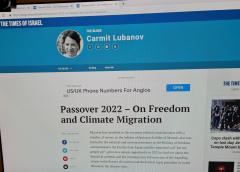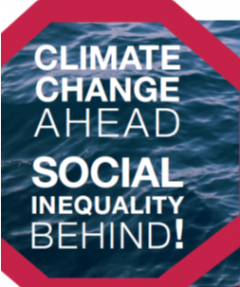Activity FieldsActivities of The Association of Environmental Justice in Israel
Cross-Cultural Reporting and Climate Change - EuroMed region
Climate Dialogue, Euro Med Region, initiated of ALF
Anna Lindh Foundation and UniMed
| Tuesday, 25-May-2021
6th_media_platform_agenda_en.pdf
Climate Change agenda and Media
alf-unimed_biographies_media_platform_25052021.pdf
participants list, Bio and publication lists
Climate Change and Migration in Euro-Med Region: Socio-Economic Development and Intercultural Perspective
New project - with Support of Anna Lindh Foundation - The Intercultural Research
Association of Environmental Justice in Israel (AEJI)
| Friday, 19-Feb-2021
Apart from the COVID epidemic and the accompanying economic crisis - the two crises that have befallen us for a long time and are expected to continue are climate change and migration, which forces people to relocate their families and migrate not only within a geographical area known to them, but cross continents and Seas to new places, without a language or their profession, they choose to migrate with hope of gaining a better future. A new program Co-initiated by Association for Environmental Justice is the "Climate Migration Initiative - a Euro-Mediterranean region" - which is a platform for education, research and political discussions aimed at raising the issue on the international agenda, states levels and within communities in destination countries in Euro-Med. The program will be an incubator for research that will deal with migration routes in the Mediterranean, civil rights, especially workers' rights, economic development and social integration, as well as a framework for discussion events on the subject.
On behalf of our partners, we would like to thank Anna Lindh Foundation for support this challenging cause.
Please find the Link for social media:
https://www.facebook.com/Climate-Migration-in-Euro-Med-Region-102913168514020
#Climate_Migration_Euro_Med
Join us, Stay tuned!
alf_climate_migration__meeting_report_31.03.2021_editedv.pdf
ALF_Climate migration_group meeting summary_31.3.2021
The 3R of Climate Migration in the Middle East and EasternThe 3R of Climate Migration in the Middle East and Eastern Mediterranean Region – Refugees, Risks, Resilience
Carmit Lubanov, AEJI
| Tuesday, 23-Oct-2018
The 3R of Climate Migration in the Middle East and Eastern Mediterranean Region –
Refugees, Risks, Resilient
Introduction
More than 500 million people live in the Middle East and North Africa. As the recent public discourse has evolved following latest IPCCC report[1] focusing on the threshold of global warming to the point where irreversible catastrophic changes could be prevented (1.5 centigrade Celsius compared to 2). The report was published at the end of the summer season (Northern Hemisphere), where the temperature during this period is already very hot in Middle East and North Africa, and will increase more than two times faster compared to the average global warming. In combination with increasing air pollution by desert dust, the environmental conditions could become intolerable and may force people to migrate[2].
The context and terminology of climate migration and refugees
Evaluating of the diverse refugees groups in the Middle East - in the prism of climate change - provides distinctive platform for studying and discussing in the academic arena and public discourse, in order to construct the long-term policy of ‘Climate migration and refugees’, in partnership with different stakeholders from neighboring countries and the international community.
A new initiative of Climate Justice in regional scale[3] was established by AEJI in 2017, aimed ‘to mitigate the climate risks and adaptation to climate security’. The research of ‘climate migration and refugees’ is part of this initiative. AEJI study has been indicating on 2 categories of ‘refugees groups’ in the Middle East and the Eastern Mediterranean Basin that should be in focus.
Firstly, brief introduction with the terminology are prevailing in the international community and international law.
The different terms in regarding to people who displaced by environmental degradation and climate change according to UNEP should be called “environmental refugees”, “environmental migrants” or “environmentally displaced people”. Each definition has real implications for the obligations of the international community under humanitarian law and the rights of the people displaced (UNEP, 2016). However, the use of the word “refugee” to describe those fleeing from environmental pressures is not accurate under international law. The majority of people forced out of their homes by environmental change will likely stay within their own borders, but there may be no possibility of return to areas that turn to be non-habitable. The difficulty regarding acceptable international definition is explained by few reasons including lack of an adequate term, long term process of displacement, difficulties with collecting data and uncertainties on their numbers. In many cases, unable to prove political persecution in their country of origin, the migrants/refuges fall through the cracks in international humanitarian law. UNEP uses the term “environmental displacement”, although acknowledging that it is not a universally accepted term.
We have adopted in our project the terms ‘climate refugees’ and ‘climate migrants’ as reflecting wide phenomena of forced population displacement linked to environmental degradation following climate change. We expand the discourse of climate change by adding the legal term in use of ‘refugees’, as is politically recognized in the Middle East, linked to Israel-Palestine conflict. Therefore, the 2 defined categories are:
1) Climate refugees – i.e. forced migration on the backdrop of environmental degradation, especially frequent occurrences of droughts, increasing of dust storms, accelerating loss of agricultural land, threatening on food security in Africa and the Middle East.
2) Refugees groups who associated with the Israeli-Palestinian conflict or other wars in the region (for example Iraq, Syria). The majority of those groups have been living in temporary or permanent refugee camps for decades, characterized with poor infrastructures. The predicted climate change in the region include the expansion of the arid areas, increase in number of hot days per year compared to previous decades, intense dust storms - all will severely impact on the living conditions of refugees in designated camps and neighborhoods, without adjusted infrastructure. Those ‘wars refugees’ will be exposed in a much more severe way to climate change, compared to other population groups in neighboring areas, in turn enhancing their vulnerability for the physical surrounding that will be affected by the climate change, and meet them as one of the less resilient population group in the region, in both terms of environment and political stability.
[1] IPCC report, September 2018
[2]Jos Lelieveld, (2016) https://www.mpg.de/10481936/climate-change-middle-east-north-africa
[3]Levant, Eastern Mediterranean Basin
aeji_the_3r_of_climate_migration_in_the_middle_east_and_eastern_mediterranean_region_wp_no.3_2018.pdf
Climate Migration and refugees in the Mediterranean
National Security and Climate Change in Israel and in the Middle East
Working paper - March 2017
Researcher: Joel Gordon, supervised by Carmit Lubanov
| Wednesday, 22-Mar-2017
national_security_and_climate_change_in_israel_and_the_middle_east__research_seminar_joel_gordon__march_2017.pdf
National security and climate change in Israel and the Middle East




